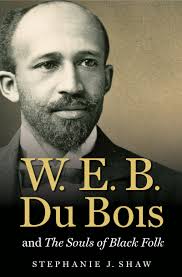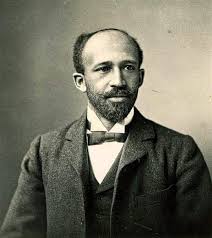The Souls of Black Folk Page #18
The Souls of Black Folk is a 1903 work of American literature by W. E. B. Du Bois. It is a seminal work in the history of sociology and a cornerstone of African-American literature. The book contains several essays on race, some of which the magazine Atlantic Monthly had previously published.
Atlanta must not lead the South to dream of material prosperity as the touchstone of all success; already the fatal might of this idea is beginning to spread; it is replacing the finer type of Southerner with vulgar money-getters; it is burying the sweeter beauties of Southern life beneath pretence and ostentation. For every social ill the panacea of Wealth has been urged,—wealth to overthrow the remains of the slave feudalism; wealth to raise the “cracker” Third Estate; wealth to employ the black serfs, and the prospect of wealth to keep them working; wealth as the end and aim of politics, and as the legal tender for law and order; and, finally, instead of Truth, Beauty, and Goodness, wealth as the ideal of the Public School. Not only is this true in the world which Atlanta typifies, but it is threatening to be true of a world beneath and beyond that world,—the Black World beyond the Veil. Today it makes little difference to Atlanta, to the South, what the Negro thinks or dreams or wills. In the soul-life of the land he is to-day, and naturally will long remain, unthought of, half forgotten; and yet when he does come to think and will and do for himself,—and let no man dream that day will never come,—then the part he plays will not be one of sudden learning, but words and thoughts he has been taught to lisp in his race-childhood. To-day the ferment of his striving toward self-realization is to the strife of the white world like a wheel within a wheel: beyond the Veil are smaller but like problems of ideals, of leaders and the led, of serfdom, of poverty, of order and subordination, and, through all, the Veil of Race. Few know of these problems, few who know notice them; and yet there they are, awaiting student, artist, and seer,—a field for somebody sometime to discover. Hither has the temptation of Hippomenes penetrated; already in this smaller world, which now indirectly and anon directly must influence the larger for good or ill, the habit is forming of interpreting the world in dollars. The old leaders of Negro opinion, in the little groups where there is a Negro social consciousness, are being replaced by new; neither the black preacher nor the black teacher leads as he did two decades ago. Into their places are pushing the farmers and gardeners, the well-paid porters and artisans, the business-men,—all those with property and money. And with all this change, so curiously parallel to that of the Other-world, goes too the same inevitable change in ideals. The South laments to-day the slow, steady disappearance of a certain type of Negro,—the faithful, courteous slave of other days, with his incorruptible honesty and dignified humility. He is passing away just as surely as the old type of Southern gentleman is passing, and from not dissimilar causes,—the sudden transformation of a fair far-off ideal of Freedom into the hard reality of bread-winning and the consequent deification of Bread. In the Black World, the Preacher and Teacher embodied once the ideals of this people—the strife for another and a juster world, the vague dream of righteousness, the mystery of knowing; but to-day the danger is that these ideals, with their simple beauty and weird inspiration, will suddenly sink to a question of cash and a lust for gold. Here stands this black young Atalanta, girding herself for the race that must be run; and if her eyes be still toward the hills and sky as in the days of old, then we may look for noble running; but what if some ruthless or wily or even thoughtless Hippomenes lay golden apples before her? What if the Negro people be wooed from a strife for righteousness, from a love of knowing, to regard dollars as the be-all and end-all of life? What if to the Mammonism of America be added the rising Mammonism of the re-born South, and the Mammonism of this South be reinforced by the budding Mammonism of its half-wakened black millions? Whither, then, is the new-world quest of Goodness and Beauty and Truth gone glimmering? Must this, and that fair flower of Freedom which, despite the jeers of latter-day striplings, sprung from our fathers’ blood, must that too degenerate into a dusty quest of gold,—into lawless lust with Hippomenes? The hundred hills of Atlanta are not all crowned with factories. On one, toward the west, the setting sun throws three buildings in bold relief against the sky. The beauty of the group lies in its simple unity:—a broad lawn of green rising from the red street and mingled roses and peaches; north and south, two plain and stately halls; and in the midst, half hidden in ivy, a larger building, boldly graceful, sparingly decorated, and with one low spire. It is a restful group, —one never looks for more; it is all here, all intelligible. There I live, and there I hear from day to day the low hum of restful life. In winter’s twilight, when the red sun glows, I can see the dark figures pass between the halls to the music of the night-bell. In the morning, when the sun is golden, the clang of the day-bell brings the hurry and laughter of three hundred young hearts from hall and street, and from the busy city below,—children all dark and heavy-haired,—to join their clear young voices in the music of the morning sacrifice. In a half-dozen class-rooms they gather then,—here to follow the love-song of Dido, here to listen to the tale of Troy divine; there to wander among the stars, there to wander among men and nations,—and elsewhere other well-worn ways of knowing this queer world. Nothing new, no time-saving devices,—simply old time-glorified methods of delving for Truth, and searching out the hidden beauties of life, and learning the good of living. The riddle of existence is the college curriculum that was laid before the Pharaohs, that was taught in the groves by Plato, that formed the trivium and quadrivium, and is to-day laid before the freedmen’s sons by Atlanta University. And this course of study will not change; its methods will grow more deft and effectual, its content richer by toil of scholar and sight of seer; but the true college will ever have one goal,—not to earn meat, but to know the end and aim of that life which meat nourishes. The vision of life that rises before these dark eyes has in it nothing mean or selfish. Not at Oxford or at Leipsic, not at Yale or Columbia, is there an air of higher resolve or more unfettered striving; the determination to realize for men, both black and white, the broadest possibilities of life, to seek the better and the best, to spread with their own hands the Gospel of Sacrifice,—all this is the burden of their talk and dream. Here, amid a wide desert of caste and proscription, amid the heart-hurting slights and jars and vagaries of a deep race-dislike, lies this green oasis, where hot anger cools, and the bitterness of disappointment is sweetened by the springs and breezes of Parnassus; and here men may lie and listen, and learn of a future fuller than the past, and hear the voice of Time:
Translation
Translate and read this book in other languages:
Select another language:
- - Select -
- 简体中文 (Chinese - Simplified)
- 繁體中文 (Chinese - Traditional)
- Español (Spanish)
- Esperanto (Esperanto)
- 日本語 (Japanese)
- Português (Portuguese)
- Deutsch (German)
- العربية (Arabic)
- Français (French)
- Русский (Russian)
- ಕನ್ನಡ (Kannada)
- 한국어 (Korean)
- עברית (Hebrew)
- Gaeilge (Irish)
- Українська (Ukrainian)
- اردو (Urdu)
- Magyar (Hungarian)
- मानक हिन्दी (Hindi)
- Indonesia (Indonesian)
- Italiano (Italian)
- தமிழ் (Tamil)
- Türkçe (Turkish)
- తెలుగు (Telugu)
- ภาษาไทย (Thai)
- Tiếng Việt (Vietnamese)
- Čeština (Czech)
- Polski (Polish)
- Bahasa Indonesia (Indonesian)
- Românește (Romanian)
- Nederlands (Dutch)
- Ελληνικά (Greek)
- Latinum (Latin)
- Svenska (Swedish)
- Dansk (Danish)
- Suomi (Finnish)
- فارسی (Persian)
- ייִדיש (Yiddish)
- հայերեն (Armenian)
- Norsk (Norwegian)
- English (English)
Citation
Use the citation below to add this book to your bibliography:
Style:MLAChicagoAPA
"The Souls of Black Folk Books." Literature.com. STANDS4 LLC, 2025. Web. 25 Feb. 2025. <https://www.literature.com/book/the_souls_of_black_folk_310>.








Discuss this The Souls of Black Folk book with the community:
Report Comment
We're doing our best to make sure our content is useful, accurate and safe.
If by any chance you spot an inappropriate comment while navigating through our website please use this form to let us know, and we'll take care of it shortly.
Attachment
You need to be logged in to favorite.
Log In